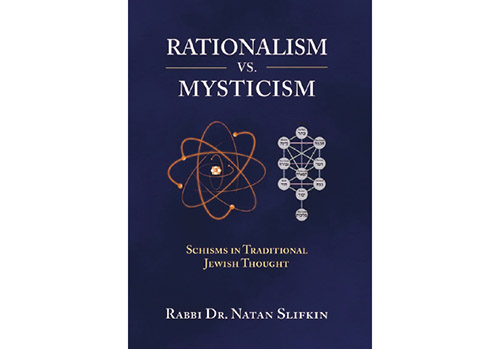

Reviewing: “Rationalism vs. Mysticism: Schisms in Traditional Judaism” by Natan Slifkin. Gefen Publishing House. 2021. English. Hardcover. 576 pages. ISBN-13: 978-9657023624.
In “Rationalism vs. Mysticism: Schisms in Traditional Judaism” (Gefen Publishing House), Rabbi Dr. Natan Slifkin has written a most engaging book for not just high-school students who may struggle with specific ideas but for everyone looking to make sense of the rationalism vs. mysticism debate.
As to the challenge of rationalism vs. mysticism, the truth be told, no one, and I would go so far as to include Rambam in this category, is entirely rational. People have their biases, and while we all have the capacity for fully rational thought, being a human means being driven in part by emotion.
While Slifkin considers himself a rationalist and has a blog, Rationalist Judaism, he admits that a serious problem with rationalism is that it is not a fully worked-out system. Moreover, when it comes to Torah and its often seemingly irrational laws, rationalism can have disastrous consequences. While there are apparent problems and dangers with the rationalist approach, it still has a long and rich heritage in Judaism, from Abraham, Maimonides, and many in our times.
Slifkin is a superb writer and deals with numerous fascinating topics. Engaging subjects, such as brain death, the nature of miracles, the evolution of the size of an olive, Talmudic medicine, demons, and many more, make this a fascinating read. Each topic is well-researched, and Slifkin gives ample sources for the reader who wants to dig deeper.
When framed in the context of the debate between the Vilna Gaon (rationalist) vs. the Baal Shem Tov (mystic par excellence) in 2022, the mystics have clearly won the battle. The mystical approach is dominant not just amongst Hasidim but in the yeshiva world also.
The trend toward the dominance of the mystical approach shows no signs of abating anytime soon. But for those looking to understand the nature of rationality within Judaism and how it was long the dominant approach in our religion, “Rationalism vs. Mysticism” is a thought-provoking and engaging book.
Reviewing: “Pesaḥ: Insights from the Past, Present, and Future” by the Habura. Independently published. 2022. English. Paperback. 262 pages. ISBN-13: 979-8404363463.
Rabbi Joseph Dweck is currently the Senior Rabbi of the United Kingdom’s Spanish and Portuguese Synagogue Community. He is a member of The Habura, an online and global Bet Midrash, which recently published “Pesaḥ: Insights from the Past, Present, and Future.”
Rabbi Dweck’s essay “On Time and Freedom” shows him to be a man of deep thoughts and insights. Pesach is a holiday designed to engage us in the thought, speech and behavior that encourages and guides us to live lives of freedom. His essay articulately expresses those themes.
The book is a compendium of essays on the holiday of Pesach from a variety of authors, with a focus on the Sephardi tradition. The 20 chapters are from a variety of authors. Some of them are scholars, such as Rabbi Dweck and Rabbi Abraham Faur (son of the late, great Rav José Faur), while others are college students.
I found the essay by Rabbi Faur to be the most interesting. He writes that the first verse in the book of Exodus uses the term beto, which is a synonym that generally means house. However, more specifically, it means family in the context of the verse. This meant that every Jewish child in Egypt was raised by a mother and father.
He also notes that because the holy texts of Hebrew contain no vowels or consonant marks, Jewish consonantal readings require the new reader to supply both vowels and punctuation marks. Hence, children are taught at a young age to analyze and combine letters precisely while concurrently joining words to create sentences, ultimately attaining a precise reading of the texts.













